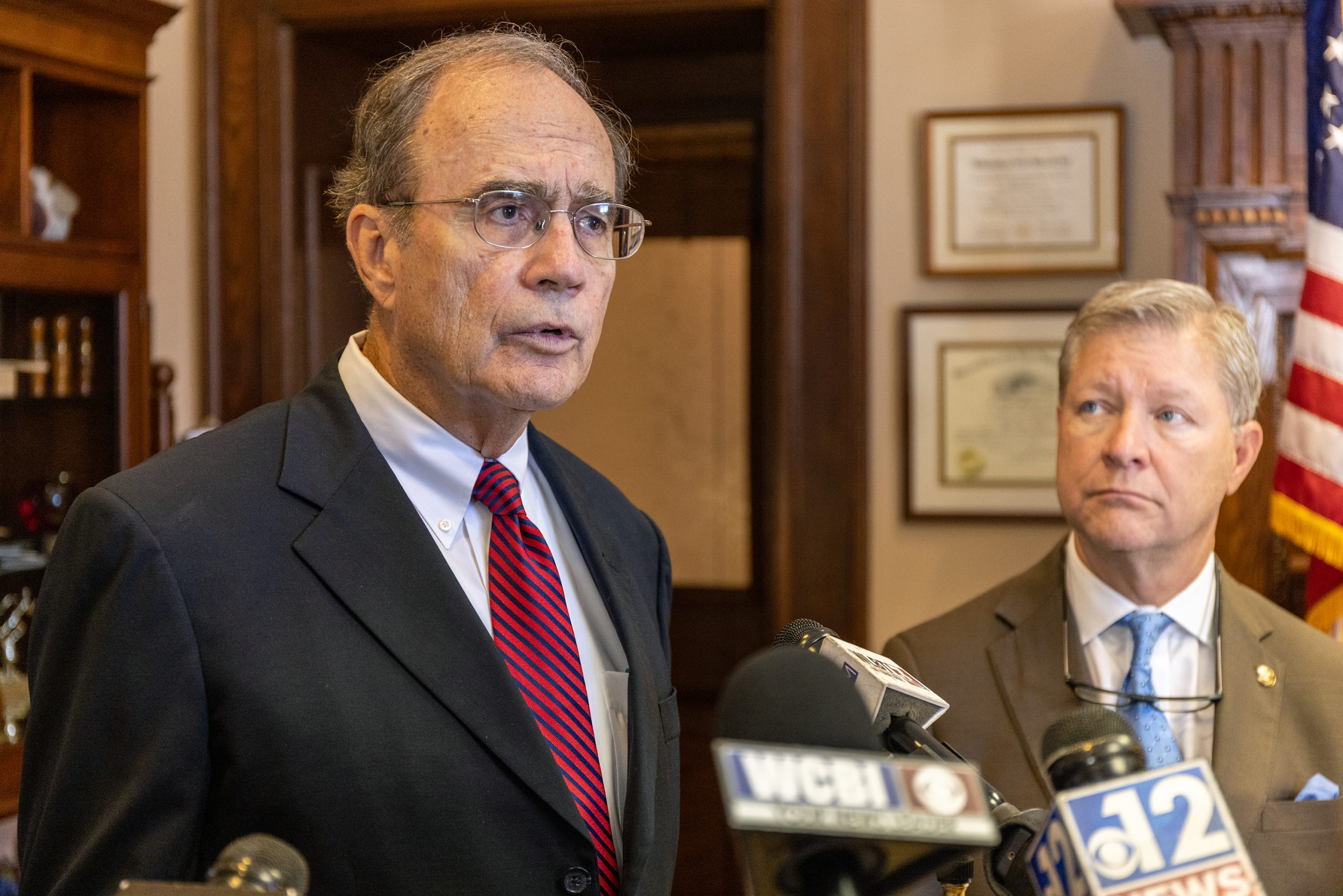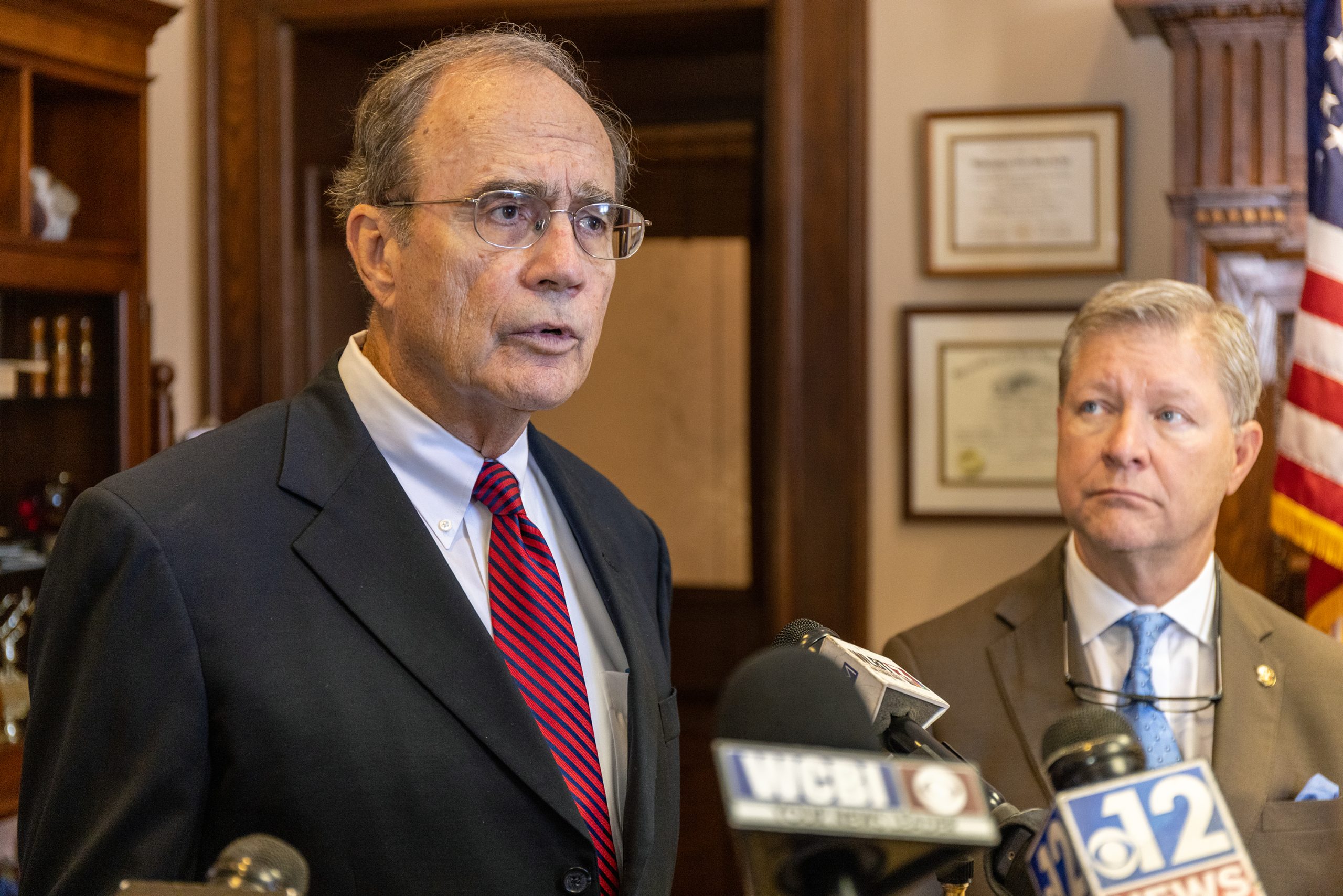Mississippi Today
Session 2023: Hosemann proposes tax refund checks up to $500, increased ed spending, health care fixes


Session 2023: Hosemann proposes tax refund checks up to $500, increased ed spending, health care fixes
Lt. Gov. Delbert Hosemann wants to send taxpayers rebate checks up to $500, increase education spending and push year-’round schooling and pre-K, and find fixes for the state’s health care crisis “not just for next year, but for the next generation.”
Some of his policy priorities for the 2023 legislative session that starts Jan. 3 already put Hosemann and the Senate he oversees at odds with his fellow Republican leaders in the House. For starters, House Speaker Philip Gunn and other GOP leaders said recently they want to eliminate the state income tax, not give one-time rebate checks. House and Senate Republican majorities are also expected to spar over extending postpartum Medicaid coverage for working mothers, which Hosemann and Senate leaders continue to support after it failed in the House last session.
READ MORE: Phase out income tax or cut taxpayers checks? GOP lawmakers, governor disagree
“We did the largest tax cut ever last year, close to $500 million in income taxes cut,” Hosemann said. “We have an excess of $270 million this year from our estimate of taxes we’ve collected. We propose to send it back.”
Hosemann said his proposal will be to refund taxpayers “dollar-for-dollar” what they paid in state income taxes for the past year “from the bottom up, until we run out of money.” He said initial estimates are that refund checks would be capped at about $500.
Republicans Gov. Tate Reeves and Gunn still want to phase out the personal income tax, as a follow-on to the massive income tax cuts passed last year, which are still being implemented. They say this will give the state an advantage with economic development.
Hosemann and Senate leaders say the national and state economies are in turbulent, inflationary times with recession possible, and that much of the state surplus is from unprecedented federal spending that isn’t likely to continue or recur. They warn that fully eliminating the income tax in such uncertain economic times is foolhardy, and that the state’s current windfall should be viewed as one-time money and given back to taxpayers as a one-time check.
Hosemann said he has been meeting with hospital and other health care officials across the state, including Greenwood Leflore Hospital, which he called the “canary in the mine” of the financial crisis facing the state’s hospitals, particularly in rural areas. Hosemann said he foresees the state providing some temporary financial aid and increased Medicaid reimbursement to struggling hospitals, but said he wants to find more permanent, structural fixes.
Hosemann said Mississippi’s health care infrastructure may have to change — particularly given population loss in the Delta and other areas. He said rural hospitals may have to shift to basic and emergency services, with more specialized care becoming centralized.
“I don’t want mommas having babies in the back of a car,” Hosemann said. “I think everyone should be within 30 minutes of care. But for that scheduled heart surgery, you may have to go to a larger hospital for it.”
Hosemann is one of few Republican leaders open to discussion of Medicaid expansion — pushed by many health care advocates and hospitals — but he said politically it’s not likely lawmakers will tackle that issue this year, and he said it’s not a cure-all.
“I don’t think that’s the answer,” Hosemann said. “Even if we had that expansion, (Greenwood Leflore) would not make it, it would still be short.”
Hosemann noted that the Senate has passed extension of postpartum Medicaid coverage for working mothers three times, with the House killing it. He said he expects the Senate to make the push to extend coverage from 60 days to a year again, as a way of helping the state address highest in the nation rates of infant and maternal mortality. He said a new study from Texas extending the coverage has shown numerous positive results.
In recent Senate hearings, numerous experts told lawmakers that Mississippi can spend about $7 million a year to keep mothers and newborns healthier, or continue to spend tens of millions more dealing with the fallout of having theworst infant and maternal mortality and morbidityin the country.
READ MORE: Extending postpartum coverage to Mississippi mothers ‘a no brainer,’ key lawmaker says
Hosemann said he has recently visited several school districts across the state, including in Corinth, Gulfport and Lamar County, that have started using a “modified calendar,” often referred to as year-around schooling. He said such schedules are already showing positive results here and nationwide, and he wants the state to provide incentives to districts that want to participate.
“We don’t need to just keep doing things the way they’ve always been done,” Hosemann said. He said the schedules of roughly nine weeks in school, two-to-three weeks off have been well received by parents and teachers. He said that for Lamar County, it cost about $200,000 to change the calendar and “that will be our measure to incentivize this with state grants for districts that want to do it.”
Hosemann said he wants to increase funding for pre-K public education. The Legislature has increased funding for early learning collaboratives to $16 million, funding about 30 programs across the state, plus another $20 million for other public pre-K programs, Hosemann said. But the state is still serving only about 6,000 of 20,000 eligible kids. Hosemann said he would like to increase that number to about 10,000 students in the coming year.
Recently House Education Chairman Richard Bennett, R-Long Beach, said he also would like to expand pre-K in the coming session. He noted that the state should not only provide more money for the programs, but provide schools with capital funding to build facilities for pre-K classes.
Hosemann also said he wants to increase funding in the coming year for the Mississippi Adequate Education Program. MAEP is the state’s school funding formula passed into law by the Legislature 25 years ago, but almost never fully funded, usually falling short hundreds of millions of dollars a year. Hosemann said Wednesday he wants to increase funding for MAEP, but declined to give an amount. He said it would likely still fall short of full funding, but “will be enough to make you smile.”
But Gunn recently said he was not for putting more money into MAEP. In the past, Gunn has unsuccessfully pushed to scrap the formula, which he said is flawed and continually calls for more money for schools that lawmakers can come up with. He called it “unattainable,” and has instead pushed for money going outside the formula to school programs lawmakers support rather than a formula that allows schools and districts autonomy on spending.
Hosemann said the state Legislature and federal government have pumped historic amounts of money into infrastructure in the last couple of years, and he plans to continue. He said the state will likely use remaining federal pandemic stimulus money to provide more matching water and sewerage money to cities and counties as it did last year. He said he also wants to provide another $100 million for the state’s Emergency Road and Bridge Program as it did last year. The state had recently faced closure of hundreds of roads and bridges, particularly in rural areas, due to lack of maintenance, but Hosemann said the state is well along in addressing the problem.
Hosemann said the state this year let about $963 million worth of road work contracts, “double what they normally would.”
Mississippi has seen huge budget windfalls since the federal government began pumping pandemic stimulus and infrastructure spending into the states. Hosemann said the state will have paid off about $600 million in debt during this time, increased its “rainy day fund” savings to about $700 million, and he proposes no state borrowing for the coming year.
“That means you don’t have to go out into the market to borrow at 6%-7%,” Hosemann said. “… We started a few years ago cutting our budget and getting things in order. We’re running Mississippi like a business and now we have the cash to address the issues we need to address.”
This article first appeared on Mississippi Today and is republished here under a Creative Commons license.
Did you miss our previous article…
https://www.biloxinewsevents.com/?p=201816
Mississippi Today
Speaker White wants Christmas tree projects bill included in special legislative session

House Speaker Jason White sent a terse letter to Lt. Gov. Delbert Hosemann on Thursday, saying House leaders are frustrated with Senate leaders refusing to discuss a “Christmas tree” bill spending millions on special projects across the state.
The letter signals the two Republican leaders remain far apart on setting an overall $7 billion state budget. Bickering between the GOP leaders led to a stalemate and lawmakers ending their regular 2025 session without setting a budget. Gov. Tate Reeves plans to call them back into special session before the new budget year starts July 1 to avoid a shutdown, but wants them to have a budget mostly worked out before he does so.
White’s letter to Hosemann, which contains words in all capital letters that are underlined and italicized, said that the House wants to spend cash reserves on projects for state agencies, local communities, universities, colleges, and the Mississippi Department of Transportation.
“We believe the Senate position to NOT fund any local infrastructure projects is unreasonable,” White wrote.
The speaker in his letter noted that he and Hosemann had a meeting with the governor on Tuesday. Reeves, according to the letter, advised the two legislative leaders that if they couldn’t reach an agreement on how to disburse the surplus money, referred to as capital expense money, they should not spend any of it on infrastructure.
A spokesperson for Hosemann said the lieutenant governor has not yet reviewed the letter, and he was out of the office on Thursday working with a state agency.
“He is attending Good Friday services today, and will address any correspondence after the celebration of Easter,” the spokesperson said.
Hosemann has recently said the Legislature should set an austere budget in light of federal spending cuts coming from the Trump administration, and because state lawmakers this year passed a measure to eliminate the state income tax, the source of nearly a third of the state’s operating revenue.
Lawmakers spend capital expense money for multiple purposes, but the bulk of it — typically $200 million to $400 million a year — goes toward local projects, known as the Christmas Tree bill. Lawmakers jockey for a share of the spending for their home districts, in a process that has been called a political spoils system — areas with the most powerful lawmakers often get the largest share, not areas with the most needs. Legislative leaders often use the projects bill as either a carrot or stick to garner votes from rank and file legislators on other issues.
A Mississippi Today investigation last year revealed House Ways and Means Chairman Trey Lamar, a Republican from Sentobia, has steered tens of millions of dollars in Christmas tree spending to his district, including money to rebuild a road that runs by his north Mississippi home, renovate a nearby private country club golf course and to rebuild a tiny cul-de-sac that runs by a home he has in Jackson.
There is little oversight on how these funds are spent, and there is no requirement that lawmakers disburse the money in an equal manner or based on communities’ needs.
In the past, lawmakers borrowed money for Christmas tree bills. But state coffers have been full in recent years largely from federal pandemic aid spending, so the state has been spending its excess cash. White in his letter said the state has “ample funds” for a special projects bill.
“We, in the House, would like to sit down and have an agreement with our Senate counterparts on state agency Capital Expenditure spending AND local projects spending,” White wrote. “It is extremely important to our agencies and local governments. The ball is in your court, and the House awaits your response.”
This article first appeared on Mississippi Today and is republished here under a Creative Commons Attribution-NoDerivatives 4.0 International License.
Mississippi Today
Advocate: Election is the chance for Jackson to finally launch in the spirit of Blue Origin

Editor’s note: This essay is part of Mississippi Today Ideas, a platform for thoughtful Mississippians to share fact-based ideas about our state’s past, present and future. You can read more about the section here.
As the world recently watched the successful return of Blue Origin’s historic all-women crew from space, Jackson stands grounded. The city is still grappling with problems that no rocket can solve.
But the spirit of that mission — unity, courage and collective effort — can be applied right here in our capital city. Instead of launching away, it is time to launch together toward a more just, functioning and thriving Jackson.
The upcoming mayoral runoff election on April 22 provides such an opportunity, not just for a new administration, but for a new mindset. This isn’t about endorsements. It’s about engagement.
It’s a moment for the people of Jackson and Hinds County to take a long, honest look at ourselves and ask if we have shown up for our city and worked with elected officials, instead of remaining at odds with them.
It is time to vote again — this time with deeper understanding and shared responsibility. Jackson is in crisis — and crisis won’t wait.
According to the U.S. Census projections, Jackson is the fastest-shrinking city in the United States, losing nearly 4,000 residents in a single year. That kind of loss isn’t just about numbers. It’s about hope, resources, and people’s decision to give up rather than dig in.
Add to that the long-standing issues: a crippled water system, public safety concerns, economic decline and a sense of division that often pits neighbor against neighbor, party against party and race against race.
Mayor Chokwe Antar Lumumba has led through these storms, facing criticism for his handling of the water crisis, staffing issues and infrastructure delays. But did officials from the city, the county and the state truly collaborate with him or did they stand at a distance, waiting to assign blame?
On the flip side, his runoff opponent, state Sen. John Horhn, who has served for more than three decades, is now seeking to lead the very city he has represented from the Capitol. Voters should examine his legislative record and ask whether he used his influence to help stabilize the administration or only to position himself for this moment.
Blaming politicians is easy. Building cities is hard. And yet that is exactly what’s needed. Jackson’s future will not be secured by a mayor alone. It will take so many of Jackson’s residents — voters, business owners, faith leaders, students, retirees, parents and young people — to move this city forward. That’s the liftoff we need.
It is time to imagine Jackson as a capital city where clean, safe drinking water flows to every home — not just after lawsuits or emergencies, but through proactive maintenance and funding from city, state and federal partnerships. The involvement of the U.S. Environmental Protection Agency in the effort to improve the water system gives the city leverage.
Public safety must be a guarantee and includes prevention, not just response, with funding for community-based violence interruption programs, trauma services, youth job programs and reentry support. Other cities have done this and it’s working.
Education and workforce development are real priorities, preparing young people not just for diplomas but for meaningful careers. That means investing in public schools and in partnerships with HBCUs, trade programs and businesses rooted right here.
Additionally, city services — from trash collection to pothole repair — must be reliable, transparent and equitable, regardless of zip code or income. Seamless governance is possible when everyone is at the table.
Yes, democracy works because people show up. Not just to vote once, but to attend city council meetings, serve on boards, hold leaders accountable and help shape decisions about where resources go.
This election isn’t just about who gets the title of mayor. It’s about whether Jackson gets another chance at becoming the capital city Mississippi deserves — a place that leads by example and doesn’t lag behind.
The successful Blue Origin mission didn’t happen by chance. It took coordinated effort, diverse expertise and belief in what was possible. The same is true for this city.
We are not launching into space. But we can launch a new era marked by cooperation over conflict, and by sustained civic action over short-term outrage.
On April 22, go vote. Vote not just for a person, but for a path forward because Jackson deserves liftoff. It starts with us.
Pauline Rogers is a longtime advocate for criminal justice reform and the founder of the RECH Foundation, an organization dedicated to supporting formerly incarcerated individuals as they reintegrate into society. She is a Transformative Justice Fellow through The OpEd Project Public Voices Fellowship.
This article first appeared on Mississippi Today and is republished here under a Creative Commons Attribution-NoDerivatives 4.0 International License.![]()
Mississippi Today
On this day in 1959, students marched for integrated schools

April 18, 1959

About 26,000 students took part in the Youth March for Integrated Schools in Washington, D.C. They heard speeches by Martin Luther King Jr., A. Phillip Randolph and NAACP leader Roy Wilkins.
In advance of the march, false accusations were made that Communists had infiltrated the group. In response, the civil rights leaders put out a statement: “The sponsors of the March have not invited Communists or communist organizations. Nor have they invited members of the Ku Klux Klan or the White Citizens’ Council. We do not want the participation of these groups, nor of individuals or other organizations holding similar views.”
After the march, a delegation of students went to present their demands to President Eisenhower, only to be told by his deputy assistant that “the president is just as anxious as they are to see an America where discrimination does not exist, where equality of opportunity is available to all.”
King praised the students, saying, “In your great movement to organize a march for integrated schools, you have awakened on hundreds of campuses throughout the land a new spirit of social inquiry to the benefit of all Americans.”
This article first appeared on Mississippi Today and is republished here under a Creative Commons Attribution-NoDerivatives 4.0 International License.![]()
-

 News from the South - Arkansas News Feed7 days ago
News from the South - Arkansas News Feed7 days agoMeasles cases confirmed in Arkansas children after travel exposure
-

 News from the South - Alabama News Feed7 days ago
News from the South - Alabama News Feed7 days agoImpacts of Overdraft Fees | April 11, 2025 | News 19 at 10 p.m.
-

 Mississippi Today5 days ago
Mississippi Today5 days agoOn this day in 1873, La. courthouse scene of racial carnage
-

 News from the South - Georgia News Feed7 days ago
News from the South - Georgia News Feed7 days ago1-on-1 with Gov. Kemp’s Senior Advisor | Full interview
-

 News from the South - Missouri News Feed7 days ago
News from the South - Missouri News Feed7 days agoMom and son targeted in carjackings, stolen cars crime spree
-

 Local News6 days ago
Local News6 days agoAG Fitch and Children’s Advocacy Centers of Mississippi Announce Statewide Protocol for Child Abuse Response
-

 Local News5 days ago
Local News5 days agoSouthern Miss Professor Inducted into U.S. Hydrographer Hall of Fame
-

 News from the South - Arkansas News Feed7 days ago
News from the South - Arkansas News Feed7 days agoFederal investigators looking into cause of deadly NYC helicopter crash













































